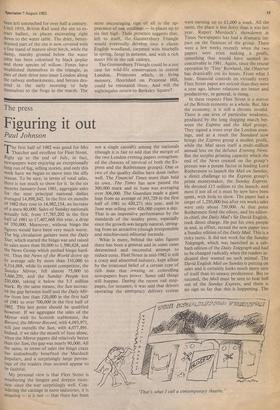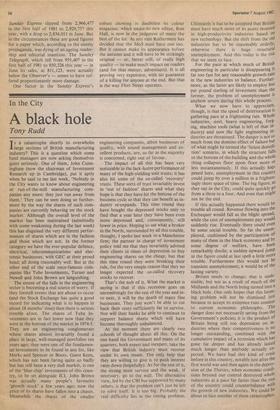The press
Figuring it out
Paul Johnson
The first half of 1982 was good for Mrs Thatcher and excellent for Fleet Street. Right up to the end of July, in fact, newspapers were enjoying an exceptionally long run of big, selling stories, and only this week have we begun to move into the silly season. To be sure, in terms of total sales, there is not much to show for it. In the six months January-June 1981, aggregate sales for the nine principal national dailies averaged 14,898,842. In the first six months of 1982 they rose to 14,982,154, an increase of a mere 80,000. Sales of Sunday nationals actually fell, from 17,785,202 in the first half of 1981 to 17,407,668 this year, a drop of 350,000. Moreover, without bingo the figures would have been very much worse. The big circulation gainers were the Daily Star, which started the bingo war and raised its sales more than 50,000 to 1,390,628, and the News Group which pushed bingo hard- est. Thus the News of the World drove up its average sale by more than 310,000 to 4,314,008, while its nearest competitor, the Sunday Mirror, fell almost 75,000 to 3,666,250, and the Sunday People lost 230,000, taking it below the 3.5 million Mark. By the same means, the Sun increas- ed the gap between itself and the Daily Mir- ror from less than 120,000 in the first half of 1981 to over 700,000 in the first half of 1982. This last point should be qualified however. If we aggregate the sales of the Mirror with its Scottish stablemate, the Record, the Mirror-Record, with 4,093,971, still just outsells the Sun, with 4,077,891. Indeed, if we take the month of June alone, when the Mirror papers did relatively better than the Sun, the gap was nearly 90,000. All the same, in terms of sales the bingo craze has undoubtedly benefited the Murdoch Populars, and a surprisingly large percen- tage of the readers thus secured appear to be faithful.
My personal view is that Fleet .Street is weathering the longest and deepest reces- sion since the war surprisingly well. Con- sidering the carnage in most industries, it is amazing — is it not — that there has been not a single casualty among the nationals (though it is fair to add that the merger of the two London evening papers strengthen- ed the chances of survival of both the Ex- press and the Rothermere groups). One or two of the quality dailies have done rather well. The Financial Times more than held its own. The Times has now passed the 300,000 mark and in June was averaging over 306,000. The Guardian made a giant leap from an average of 393,729 in the first half of 1981 to 420,271 this year, and in June was selling over 426,000 copies a day. That is an impressive performance by the standards of the quality press, especially since the growth was largely natural, spring- ing from an attractive (though irresponsible and mischievous) editorial formula.
What is more, behind the sales figures there has been a general and in some cases determined and successful attempt to reduce costs. Fleet Street in mid-1982 is still a crazy and abnormal industry, kept afloat by the irrational belief of a certain type of rich man that owning or controlling newspapers buys power. Some odd things still happen. During the recent rail stop- pages, for instance, it was said that drivers operating the emergency delivery system
were earning up to £1,000 a week. All the same, the place is less dotty than it was last year. Rupert Murdoch's showdown at Times Newspapers has had a dramatic im- pact on the finances of the group. There were a few weeks recently when the two papers were even making a profit, something that would have seemed in- conceivable in 1981. Again, since the rescue operation by 'Tiny' Rowland, the Observer has drastically cut its losses. From what I hear, financial controls on virtually every Fleet Street paper are stricter than they were a year ago, labour relations are better and productivity, in general, is rising.
In these respects Fleet Street is a mirror of the British economy as a whole. But, like the economy, it is still a chronic invalid. There is one area of particular weakness, produced by the long slugging match bet- ween the Express and the Mail groups. They signed a truce over the London even- ings, and as a result the Standard now brings the Express group a modest profit, while the Mail saves itself a multi-million annual loss on the defunct Evening News. But the surplus printing capacity which the end of the News created on the group's presses was a potent factor in leading Lord Rothermere to launch the Mail on Sunday, a direct challenge to the Express group's prime moneymaker, the Sunday Express. He devoted £13 million to the launch, and most if not all of it must by now have been spent, with little to show. The paper had a target of 1,250,000 but after ten weeks sales were only about 750,000. At that point Rothermere fired the editor, and his editor- in-chief, the Daily Mail's Sir David English, took direct charge. He put his own people in and, in effect, turned the new paper into a Sunday edition of the Daily Mail. This is a risky tactic. It did not work for the Sunday Telegraph, which was launched as a sab- bath edition of the Daily Telegraph and had to be changed radically when the readers in- dicated they wanted no such animal. The David English Mail on Sunday is putting on sales and it certainly looks much more sure of itself than its uneasy predecessor. But to succeed, the MoS must be seen to beat hell out of the Sunday Express, and there is no sign so far that this is happening. The 'That's what I call a contemporary theatre.' Sunday Express slipped from 2,966,477 in the first half of 1981 to 2,929,757 this year, with a drop to 2,834,011 in June. But in the circumstances these are good figures for a paper which, according to the enemy propaganda, was dying of an ageing reader- ship and editorial inanition. The Sunday Telegraph, which fell from 955,407 in the first half of 1981 to 850,326 this year — in June its sales, at 811,123, were actually below the Observer's — seems to have suf- fered proportionately more damage.
One factor in the Sunday Express's robust showing is doubtless its colour magazine, which under its new editor, Ron Hall, is now in the judgment of many the best of the lot. At any rate Rothermere has decided that the MoS must have one too. But it cannot make its appearance before the autumn and it will have to be strikingly original — or, better still, of really high quality — to make much impact on readers (and for that matter, advertisers). It is all proving very expensive, with no guarantee of a killing for anyone at the end. But that is the way Fleet Street operates.



































 Previous page
Previous page